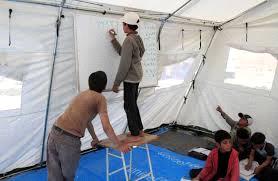Ammon News - (AP) — Every day at dawn, teenager Sultan Ahmad al-Saleh gets up and starts work, 12 hours in the fields picking vegetables in this remote corner of northwestern Jordan. It's what he's been doing for the past three years, ever since he was 14 years old and his family fled here to escape Syria's civil war.
The boy and his family are part of a nearly forgotten pocket of Syria's refugee crisis — some 1,200 families who have ended up living in squalid, impromptu tent communities in the Jordan Valley. Until recently, they have lived below the radar among the 1.2 million Syrians who have flooded into Jordan since the conflict next door began in early 2011.
The majority of those refugees have moved into Jordan's towns and cities, many of them impoverished but able to reach facilities and access aid from the United Nations and other international groups. Jordan also has two organized encampments near the northern border with Syria. The largest of them is Zaatari camp, with a population of 120,000, where refugees are under direct care of the United Nations and the Jordanian government. In total, international aid reaches about 595,000 registered refugees.
But the approximately 7,000 Syrians living here, half of them children, have been largely scraping by on their own. Most of them are farming families from Syria's central provinces of Hama and Homs, both heavy battle zones between rebels and government forces. Hoping to find livelihoods, they fled to Jordan's breadbasket, in the northern Jordan Valley near the border with Israel, to work on the area's vegetable farms.
Over time, with their growing numbers, five separate tent camps have cropped up, isolated down long dirt roads, with no health care or schools and little access to U.N. food aid. Only in the past year have U.N. agencies begun reaching them with some supplies.
"We are the untold story of the Syrian crisis," said 48-year-old Abu Ahmad, a farmer who fled here with his wife and five children from the Syrian village of Maan, near Hama. "The world seems to have forgotten about us."
STORY: Behold: A Virtual Course Without Online Ed's Huge Dropout Rate
He wiped off his sweat with a red-checkered headdress under the scorching heat of the arid valley. He's worried that his children are missing out on an education — and most importantly, about his family's health. "If I, my wife or any of my children fall gravely ill in the middle of the night, we may die before anyone gets here to help us," he shouted.
In total, about 2.3 million Syrians have fled the three-year old Syrian conflict, seeking shelter in Jordan, Lebanon, Turkey, Egypt and Iraq, according to UNHCR figures. As in Jordan, most have moved into established communities or in organized camps, especially in Turkey. But in a few places, like near Lebanon's border with Syria and in the Jordan Valley, thousands still end up in self-made, informal camps.
In the largest of the Jordan Valley camps, home to around 2,000 people, tents are clumped together in a gully between a steep line of Jordan's mountains and the Jordan river, forming the border with Israel. The refugees have received tents from the U.N., but have to pay rent to the Jordanian farmers on whose land they've set up and pay for the electricity that has been strung out to them and the water supplies being shipped in.
STORY: New York Fashion Week: Chaos on the Runway
On a visit the past week by The Associated Press, children, some as young as four, played barefoot in the dust. Some slid down a gravel hill on a torn-up plastic bucket near a trash dump. A five-year-old girl named Rima clutched on two wooden sticks she called her doll as she watched the boys play.
Few of the kids attend school, and most work in the fields with their parents.
"Life has no meaning to me," said al-Saleh, the 17-year-old. "When I am off work, I get bored to death because I have no school and there isn't much to do around this ghost town anyway."
VIDEO: What Does G-Force Feel Like?
His friend, 16-year-old Saleh Khaled Mohammad, who also works in the fields, said: "My life has been totally wasted."
"I had wished to be an agricultural engineer, but I dropped out of school when I was in the ninth grade a year ago and it's difficult for me to go back now because I have to work to provide for my family," said the boy.
